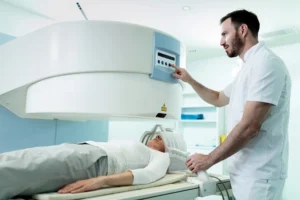The Role Good Health Plays in a Happy Retirement
- Updated on: Aug 27, 2024
- 4 min Read
- Published on Aug 21, 2023


Maintaining good health is crucial for a fulfilling retirement. Despite the desire to enjoy life after leaving the workforce, a staggering 95% of older American adults grapple with at least one chronic illness, such as diabetes, arthritis, or heart disease. These debilitating health conditions diminish independence and necessitate reliance on others for assistance. As health deteriorates, the need for support intensifies. Nevertheless, an overwhelming 75% of US adults aged 50 and above express a shared aspiration to delay transitioning to assisted living for as long as possible.
You only get weaker as you age, so why not start caring for yourself now? It’s not just about staying in shape but also about remaining independent and aging with grace. If you want to make the most of your retirement, here’s how to stay healthy.
Routine checkups
Routine checkups ensure you get a timely diagnosis of any underlying health conditions you may have. They help you keep track of your health and monitor potential health risks. They are also crucial in determining the presence of cancer-inducing substances. Suppose you got exposed to asbestos, a carcinogen that causes mesothelioma that affects 3,000 Americans yearly. In that case, these checkups can provide you with the necessary medical information to build a case and get compensation.
If you or your loved one has been diagnosed with mesothelioma, you can file a lawsuit for financial support and closure. Treating this condition is especially expensive and emotionally taxing, so getting justice is crucial. You can contact trustworthy mesothelioma law firms, like Simmons Hanly Conroy, which secured over $9.3 billion for asbestos victims nationwide to gain a reasonable settlement. These experienced professionals can handle every step of the legal process for you.
Routine checkups empower you to take a proactive approach toward your health. Considering the mesothelioma lawsuit as an example, you never know when you can develop such harmful illnesses. As an older adult, you should get a medical checkup at least once a year to ensure you are aware of your health conditions and have the option to treat them promptly.
Staying active
According to CDC, it would be best for older adults older than 65 to indulge in moderate-intensity exercises for at least 150 minutes weekly. Staying physically active can delay the health complications that come with old age. Apart from reducing the risks of developing chronic conditions like heart disease and obesity, daily exercise can also improve bone density. Stronger bones are essential in old age as they reduce the risk of fatal injuries from falling. The CDC reports that tumbling is the top reason for injury and death among adults over 65 years, with a mortality rate of 17%. These accidents can be especially harmful to women post-menopause, as they lose around 2% of their bone density yearly.
To live happily after retirement, you should take care of your physical health by going on brisk walks around the neighborhood, signing up for tai chi classes, or trying out water aerobics. Don’t let your age stop you from improving your physical fitness. Once you get used to the movement, you can increase the intensity or try weighted exercises or strength training. Improving your muscle mass is also an excellent way to prevent injuries from falling and keeps you independent by giving you more control over your limbs.
Developing a positive mindset
Happiness is known to slow down signs of aging. It reduces stress, lowers mortality, and improves health. Studies suggest that optimistic individuals actually live longer, making it to 85. It reports that men and women with a positive mindset have a 75% and 50% chance of a longer lifespan, respectively.
However, the more you age, the harder it is to stay optimistic. With more than 7 million depressed older US each year, you must actively try to develop a positive mindset. Start by making plans and creating a list of things you look forward to or are grateful for. You need to find reasons to appreciate life and seek reasons to live. Remember that you can have bad days and feel sad but still have hope that things will turn out for the better.
Trying out new hobbies
It’s always possible to start learning a new skill or a hobby. As a retired adult, you may get bored with the sudden free time. However, it’s essential to spend it wisely. Instead of staying in bed all day and watching the days go by, you should take control of your life by learning something new. Indulge in hobbies you wanted to try but needed more time to while you were working a nine-to-five job. Learn to play an instrument, start gardening, or dabble at painting.
By stimulating your mind during your retirement, you reduce the risks of cognitive impairments like Alzheimer’s or Parkinson’s and improve your memory. Learning these new hobbies also gives you a sense of accomplishment and keeps your social life active. You can join art clubs, proudly display your paintings, and connect with other art lovers. Make your retirement a fun adventure by learning new skills.
Socializing
Around 50% of American adults older than 60 are at risk of social isolation. A CNN article also suggests that people with weak social bonds are at a 50% greater risk of early death than those with solid relationships. Feeling lonely is not a pleasant experience for your mind and body. Anxiety and depression aside, isolation can put you at risk for high blood pressure and cognitive decline and even weaken your immune system.
Socializing becomes especially important when you retire and have too much time to get wrapped up in your thoughts. Interacting with your loved ones can keep you from going down a dark spiral and increase your happiness. Research also links socializing with longevity, suggesting that daily interactions with others among older adults can improve health outcomes and increase lifespan. Considering that retirement gives you more than enough time to spend with your friends and family, take this opportunity to make as many plans as possible.
Conclusion
Consider your retirement as a start of a new journey rather than an end of an era. Don’t let your age stop you from living on your own terms. There is still so much to see and memories to create. A healthy body and mind will carry you through a happy retirement. All you need to do is take care of yourself.












